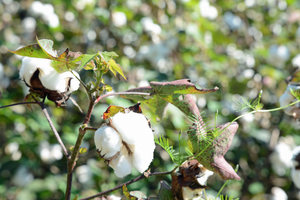What is a GMO?
A genetically modified organism (GMO) is an animal, plant or micro-organism (for example, a bacteria) that has been modified in the laboratory by adding or subtracting a gene such that a given characteristic—which was not present before—is expressed. The example closest to us is Bt cotton. This is a plant that has been genetically modified to produce its own pesticide. So when this cotton grows, it produces a pesticide in its roots, stems, leaves and flowers to fight against pests on its own without being sprayed with an external pesticide.
How are GMOs made?
GMOs are produced in a laboratory rather than by selecting and crossbreeding plants in the field. A scientist isolates the desired gene from a given species and then adds it to the chromosome of another organism, inserting the gene into the cell of the organism they want to modify. This organism may belong to a completely different species. If the operation is successful, then researchers can multiply the new plant—first in the lab, then in greenhouses, and then in the field. For example, to create Bt cotton, scientists took a gene from a soil microbe called Bacillus thuringiensis, which allows bacteria to produce a toxic substance, and introduced this gene into the cells of cotton plants in the lab.
A brief history
In agriculture, the first GMOs were produced in the early 1990s. Aware of the danger that these products might pose to humanity, the scientists who created them held a meeting in the United States at Asilomar, California, in 1995, where they declared a moratorium on GMOs. But this moratorium was lifted several years later after lobbying by powerful corporations that make huge profits from GMOs. GMOs are now grown on every continent, though they are less common in Africa.
In Africa, GMOs are currently grown in South Africa, Egypt, Sudan and Burkina Faso. In India and South Africa, where Bt cotton is widespread, the GMO crop has not succeeded in eliminating pests, despite claims to the contrary by the makers of GMO. In Burkina Faso, in 2014 and again in May 2015, companies that are growing GMO cotton finally recognised that this cotton has failed. What’s more, a farmer compared the performance of varieties on two plots of land and said: "The increased harvest weight with GMOs was not more than 10% per hectare…"
The governments of Benin, Togo, Niger, Mali, Côte d'Ivoire, Senegal, Nigeria and Algeria do not have an officially position on GMOs. Instead, they are allowing scientists, ECOWAS and the World Bank to decide in their place.
Click here to download this tri-fold brochure as a pdf (English)
Download the brochure as a pdf (French)
Local African languages:
